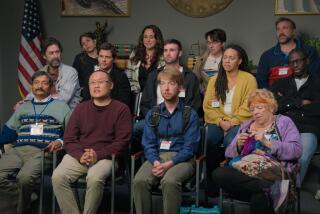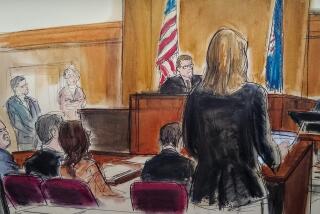Preparation Eases the Fear of Testifying
- Share via
Going to court can be an intimidating experience, especially if you have to testify.
The first time retired doctor Michael Bluhm went in a courtroom, he had to testify and bring with him medical records that had been subpoenaed.
“I became extremely apprehensive,” he wrote later. “I was ignorant of court procedures, awed by the mystique of the black-robed judges, the ominous bulging briefcases of the lawyers and the esoteric activities that went on in the hallowed chambers of justice.”
Garbled Words
In the middle of his testimony, an attorney jumped up and shouted: “I object!” At the time, the good doctor thought the lawyer said something like “Tea grounds--or beans--reverend.” (The lawyer was probably saying “irrelevant and immaterial.”)
After the attorney objected, Bluhm thought that meant he was no longer needed. He stepped down from the witness stand and headed for the door, when the bailiff said: “Hey Doc, just a minute.” The judge ordered him back to the witness stand.
That first trip to court was more than 30 years ago, and in the interim, Bluhm has testified numerous times as an expert medical witness.
He no longer tries to leave the witness stand when a lawyer objects. But his experience led him to write a short booklet for others who might be called to court and fear the unknown.
Originally prepared to advise other medical doctors who might be called to testify, the booklet’s simple explanations of courtroom activity and tips about how to act on the witness stand are a valuable resource for both professionals and lay people who have to testify.
Bluhm explains what he calls the “basic anatomy” of personal-injury litigation, making sure the reader knows that the judge’s chambers are actually his private office and that when he “retires” there, he is just leaving the room, not giving up his career.
No lawyer could disagree with his basic advice about testifying: “Just tell the truth. Be fair. Do not be an advocate (one who pleads the cause of another). Before you answer any question, be certain that you completely understand. Answer it concisely. If you do not know the answer, do not hesitate to say so. Even the most learned don’t know everything. Do not guess.”
For professionals who testify as expert witnesses, he even explains how to bill the lawyer. (The minimum charge for a medical doctor’s testimony is usually about $500, he says.)
Dr. Bluhm says he has some extra copies of his 14-page booklet entitled “The Doctor Goes to Court.” He has offered to send Legal View readers a free copy, while supplies last, if you send him a self-addressed, stamped, business-size envelope. Send your request to Michael Bluhm, 72345 Beverly Way, Rancho Mirage, Calif. 92270.
Legal Brief
Last week in my column about escrow, I mistakenly said the seller of a house would record a “deed of trust” when he transfers the property to the buyer. As several brokers and escrow officers have pointed out, I must have meant to say “grant deed” instead. That is the document that’s actually signed by the seller to transfer the property.
Attorney Jeffrey S. Klein, The Times’ senior staff counsel, cannot answer mail personally but will respond in this column to questions of general interest about the law. Do not telephone. Write to Jeffrey S. Klein, Legal View, The Times, Times Mirror Square, Los Angeles 90053.


